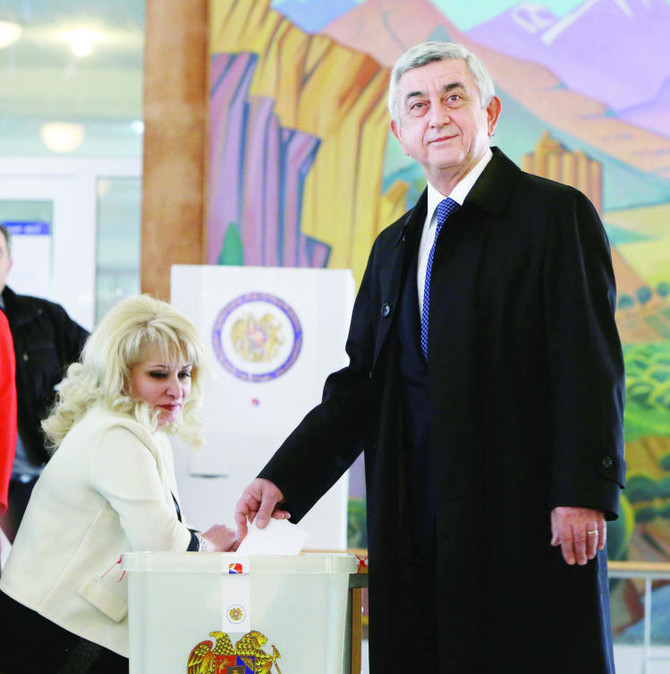YEREVAN: Armenians voted in landmark legislative elections on Sunday for the first time since the adoption of constitutional reforms aimed at transforming the ex-Soviet country into a parliamentary republic.
The election is seen by the West as a key democratic test for the small landlocked nation of 2.9 million, which has no history of transfers of power to an opposition through the ballot box.
Opposition politicians on Sunday reported violations at polling stations after previously warning that the government is preparing mass electoral fraud.
“We have recorded numerous violations at polling stations — violation of ballots’ secrecy and multiple voting,” Hovsep Khurshudyan, one of the leaders of the Ohanyan-Raffi-Oskanyan, an opposition coalition, told AFP.
Turnout stood at 13 percent three hours after polls opened, the Central Electoral Commission said in a statement.
The vote is dominated by fierce competition between the ruling party of pro-Moscow President Serzh Sarkisian and a coalition of opposition parties led by Gagik Tsarukian, a former arm wrestler who is one of the country’s wealthiest businessmen.
“I gave the Republican Party another chance because Prime Minister (Karen) Karapetyan is an energetic man with fresh ideas, he gives us hope for a better future for the country,” one voter, 37-year-old Svetlana Sarkisian, told AFP.
Another voter, 69-year-old pensioner Garnik Mnatsakanyan, said she “voted for Tsarukian who really cares about ordinary people’s lives.”
Ahead of the vote, the EU delegation to Armenia and the US Embassy said in a joint statement that they were “concerned by allegations of voter intimidation, attempts to buy votes, and the systemic use of administrative resources to aid certain competing parties.”
There are also fears of violence after 10 people were killed in 2008 clashes between police and opposition supporters following Sarkisian’s election.
This time, the country aims to hold an exemplary vote to elect “a Parliament trusted by society,” the president told AFP in an interview in March.
He said his government “has made enormous efforts so that (Sunday’s) milestone vote is flawless.”
The polls come after constitutional amendments initiated by Sarkisian in 2015 that his opponents say were designed to keep the ruling Republican Party in power.
The amendments were passed after a referendum, but they also prompted thousands to rally in protest.
They will shift the country away from strong presidency to a parliamentary form of government after Sarkisian’s second and final term ends in 2018.
The opposition alleges that the changes were made to allow Sarkisian, 62, to maintain his grip on power by remaining party leader after he steps down as president.
“The amendments will perpetuate the rule of Sarkisian and his Republican Party,” which has held onto power for two decades, said Aram Manukyan, an MP from the Armenian National Congress opposition party.
Armenian elections: A key democratic test for country
Armenian elections: A key democratic test for country











